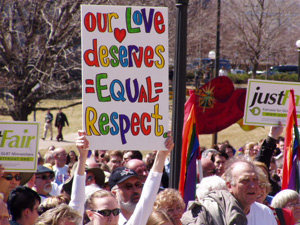|
Photos
|
 |
| An April 2005 rally at the Capitol during debate over a definition of marriage bill. (MPR file photo) |
St. Paul, Minn. — Only the voters can change the state constitution to ban gay marriage. But first the Legislature has to agree to put the measure on the ballot for a public vote. The Minnesota Senate has been the battleground on the issue of gay marriage. The Republican-controlled House overwhelmingly passed the measure twice in the past two years. As a result, both supporters and opponents have focused their time and effort on the DFL-controlled Senate. They've lined the Capitol steps, held massive rallies and jammed the Capitol phone lines lobbying senators.
DFL Senate Majority Leader Dean Johnson says it's likely that those tactics will continue next session, but he says it doesn't mean they will make a difference. That's because two DFL candidates who oppose putting the measure on the ballot are replacing Republicans who supported it.
"Will it come up? I'm sure the conservative Republicans will push the issue, but it's less likely that it finds its way to the ballot question in November now than it did last session," according to Johnson.
Johnson says he intends to hold a committee hearing on the Defense of Marriage Act but he says the Senate will focus most of its time on other issues like transportation, education and health care. He says DFLers Tarryl Clark of St. Cloud and Terri Bonoff of Plymouth won their special elections on those issues.
Supporters of the gay marriage amendment say voters do care about the issue. Gay marriage has been an issue in Minnesota since 2003 when the Massachusetts Supreme Judicial Court legalized same sex marriage in that state.
Minnesota already has a law that forbids gay marriage, but social conservatives worry the courts could overturn the law. They want the voters to decide if the Minnesota Constitution should define marriage as one man and one woman.
Republican Sen. Michele Bachmann of Stillwater says statewide polls show Minnesotans support an amendment to ban gay marriage. She says she'll continue to push for a vote even though she's lost some support in the Senate.
Bachmann says senators who may have voted against the amendment in the past may feel a bit more pressure since every member of the House and Senate is up for re-election next year.
"It could be difficult," she says. "I certainly admit that it could be difficult to get it on the ballot but the dynamic that has changed is that now we're looking at an election year and this is an issue that is extremely popular with the voters."
DFL Sen. Scott Dibble of Minneapolis calls the amendment "mean-spirited" and discriminatory against same-sex couples. Dibble says same-sex couples should enjoy the same health care, retirement and legal benefits as married, heterosexual couples.
Dibble is one of two openly gay members in the Senate. He says he's pleased the recent election victories appear to make it easier to keep the measure off of the ballot.
"Because the hysteria and the fervor have died down and because this hasn't worked for them electorally, and this is really the goal of the Republicans... to benefit themselves in the elections and it hasn't worked for them, perhaps we won't see as much distraction in this upcoming legislative session," Dibble says.
But Tom Prichard, with the Minnesota Family Council, says his organization will continue to lobby the senate. He also says that they have the support to pass the measure if Senate DFL leadership allows for a straight up-or-down vote.
"They'll have to decide if this empowers them, but we think it's an issue that will not go away and will keep coming back and there will be strong support for it and we think it will be an important issue in the fall if it doesn't get on the ballot," Prichard says.
Prichard says his organization intends to target the senators who don't support their efforts in next year's election. The big question is whether the recent special elections make opponents of the amendment even more comfortable about voting against the measure in an election year.




